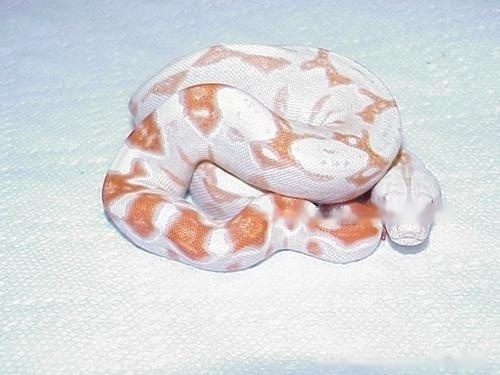Routine veterinary inspections of your snake are necessary, as many parasites can colonize ball pythons and other reptiles, as well as infect humans and other reptiles. Parasites can kill your snake if left untreated. Collect the first feces your snake pulls out in a clean plastic bag, seal it, date it, your name, phone number, the species and name of the snake, and take all of this with your snake Go to a veterinarian who treats reptiles, and if there are parasites or native bacteria, they can be checked out and given appropriate medication as treatment.

Ball python
The main diseases that ball pythons are prone to There are body surface injuries, stomatitis and pneumonia.
For body surface injuries caused by feeding and molting, we use medical alcohol for disinfection, Yunnan Baiyao or chlortetracycline eye ointment to swab until it heals. For surface pustules caused by parasite bites and fungal infections, due to the uniqueness of python skin, it is necessary to make a decisive incision and scrape the skin to induce pus. The method of medication is the same as above. And soak with 2/10,000 potassium permanganate solution and rinse.
Stomatitis is generally caused by unclean bait, hard objects stuck in the fur of live bait, and the bitten person quickly pulls his hands when attacking the breeder. The snout of the sick snake is moist, salivating, and the mouth is swollen, red, and white slag-like clots and secretions. In addition to the strict prevention of the above situations, if stomatitis has occurred, it should be treated immediately. Use 1/10,000 potassium permanganate solution to clean the wound, use cotton swabs and long medical tweezers to remove necrotic, detached skin tissue and condensed secretions, and check whether there are any remaining lost teeth in the mouth to prevent re-wounding. Filled with tetracycline drugs, supplemented by watermelon frost spray.
Pneumonia is often induced by turbid air in the rearing environment, drowning, and sudden temperature changes. Outliers often raise their heads to make breathing difficult. In the event of pneumonia, the sick python should be moved to a constant temperature, visible sunlight, and ventilated environment. Slightly fed with cotrimoxazole, cephalosporin, severe intramuscular injection of gentamicin.
Enteritis and digestive tract deworming. When enteritis occurs, use normal saline instead of ordinary water to feed, fill with oxytetracycline or leprosy, prolong the light time, and disinfect the breeding place. Under normal circumstances, use intestinal worms to deworm once every six months.
The dosage of the above drugs is 0.5~2 times the dosage of the adult per kilogram of body weight multiplied by the body weight of the python (kg)
![[Dog Training 5] The training method of pet dog dining etiquette](/static/img/12192/12192_1.jpg)




